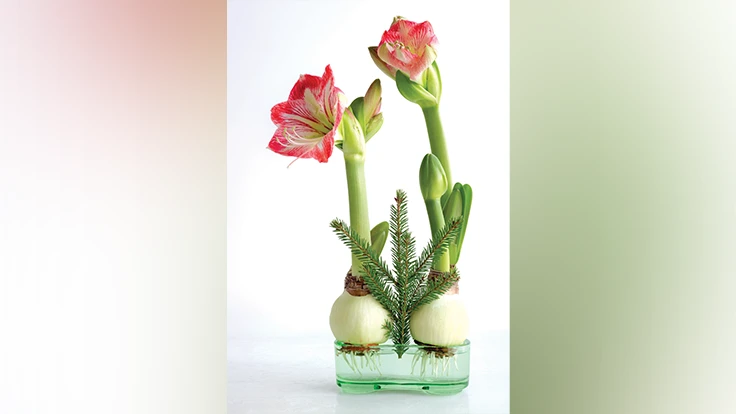

Poinsettias are the typical staple of the holidays in horticulture. But there are opportunities for growers to do more than business as usual.
Gary Vollmer, poinsettia technical manager for Selecta One, says the time is now to develop a plan for poinsettia pairings.
“Poinsettia sales have been pretty flat for the past couple of years,” he says. “There is increasing volume and formats for poinsettia combinations, and this seems to be a strong trend.”
Timing is an important factor for growers who need to know when shoppers will be looking for those typical Christmas gifts.
“The market is shifting a bit later, and with a late Thanksgiving this year, it will move even more,” Vollmer says. “Large retailers continue to move the most volume and use Black Friday poinsettia promos to drive traffic.”

When you compare it to other crops, poinsettia continues to be the volume leader. Vollmer says the other holiday crop that is really getting a resurgence is amaryllis. Katie Rotella, spokesperson for Ball Horticultural Company agrees.
“There is a growing interest in amaryllis bulbs — especially the decorative ones dipped in colored wax or glitter accents,” she says. “They’re quite gift-y and are good for all skill levels.”
She also suggests Christmas cactus, an easy-care houseplant that prefers humidity, not the arid environment we typically associate with cacti. Interest in Christmas cactus feeds into the succulent craze, while herb rosemary can serve as both a functional and fragrant item to have around the holidays. Rotella says some can be turned into wreaths or topiary art and used right in the kitchen.
Other year-round items that could work alongside traditional poinsettias are cyclamen, gerbera and ornamental peppers.
Natalie Carmolli, marketing and promotions specialist for Spring Meadow Nursery, says boxwood is also a very popular evergreen holiday plant.






“I grew up in the floral industry and we sold tons of boxwood at Christmas,” she says. “What makes them fun is that they are small and so adaptable to shaping, so they can be trimmed into a pyramidal shape, put in a container, then decorated like a Christmas tree.”
North Star Buxus is one of Spring Meadow’s most popular varieties. For those concerned with boxwood blight, North Star has shown good resistance in trials.
If your greenhouse is in a warmer climate, Carmolli asks that you consider Juke Box pyracomeles.
“I love this plant. It’s super soft, thornless and the glossy leaves are a very pleasing … dare I say holiday green,” she says. “Plus it’s a petite 1 to 3 feet — great for containers.”
Another popular holiday item is the classic “Christmas Holly.” Ilex meserveae, commonly known as blue holly, is known for its thick, shiny, pointed leaves and red berries. However, if your customers want those iconic red berries, there are a few steps to ensure they take.
One tricky aspect your retail customers may have to explain is that only the female bushes produce fruit. The berries won’t be produced at all unless there is also a male holly bush in the area to pollinate the female flowers. Spring Meadow Nursery introduced a brand new cultivar at the 2019 California Spring Trials, Castle Keep holly. At 3 to 5 feet, it’s a good contender for a patio pot. While Castle Keep has a rounded habit, the Michigan wholesale nursery also carries a pyramidal blue holly, Castle Spire.
This shrub, however, is quite big, filling out at 8 to 10 feet at maturity. Spring Meadow’s male variety is Castle Wall.
“An easy way to market holiday items is to include a gift tag with the pots. Something easy to take-and-go for seasonal parties and hostess gifts.” — Katie Rotella
Rotella offers a few marketing suggestions to help sell holiday items.
“An easy way to market holiday items is to include a gift tag with the pots — something easy to take-and-go for seasonal parties and hostess gifts,” she says.
She also suggests sleeving black pots in decorative colors or upgrading to a deco pot for more styling. Offering smaller sizes for place settings is a way for shoppers to wow guests at their next dinner party or give as party favors. Stores can also create mixed containers for indoor design. Rotella suggests including something fragrant, like herbs.
An unexpected holiday idea
Did you know that pomegranates symbolize prosperity and good luck over the holidays? In Greek culture, a single fruit is hung above the door or placed on the table) on Christmas Day. On New Year’s Day, just after midnight, the fruit is smashed on the front stoop to ensure another year of good luck for the household.
Punica is not a cold-hardy plant, but it will do well in a pot inside over the winter. Carmolli suggests Spring Meadow’s Peppy Le Pom ornamental pomegranate.
“While I wouldn’t recommend smashing the tiny ornamental pomegranates, perhaps just presenting the bright cheery plant to someone special over the holidays is already lucky?” she says. “Growers would need to plan a little to get them to flower for garden centers over the holidays, but we already do that with poinsettias, right?”

Explore the August 2019 Issue
Check out more from this issue and find your next story to read.
Latest from Greenhouse Management
- Anthura acquires Bromelia assets from Corn. Bak in Netherlands
- Top 10 stories for National Poinsettia Day
- Langendoen Mechanical hosts open house to showcase new greenhouse build
- Conor Foy joins EHR's national sales team
- Pantone announces its 2026 Color of the Year
- Syngenta granted federal registration for Trefinti nematicide/fungicide in ornamental market
- A legacy of influence
- HILA 2025 video highlights: John Gaydos of Proven Winners





